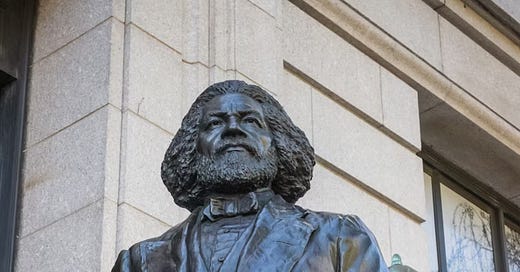Frederick Douglass’ Realistic Advice about Voting
He knew that with limited options, Black people had a clear choice.
I write articles like this to follow in the legacy of writers such as Frederick Douglass who used the power of the pen to promote democracy. If you would like to support me doing the same kind of work, you can become a paid subscriber today.
Frederick Douglass stands at the most well-known abolitionist of the 19th century.1
His daring escape from slavery with the indispensable support of his future wife, Anna Murray Douglass, and his series of autobiographies detailing the dehumanizing agony of slavery made him a household name.
Douglass did not simply talk and write about his experiences, he did so with a boldness and clarity that may have sounded bracing to some.
The famed abolitionist applied his characteristic no-nonsense approach to voting.
In 1883, a man identified as Private Dalzell wrote to Frederick Douglass inquiring about his position on the “colored question” and voting.
Douglass’ words reveal a clear-eyed, pragmatic approach to politics that many Black Americans have displayed since at least the passage of the 15th Amendment in 1870 that granted Black men the right to vote.
The political calculations Black people have had to make in the United States offer perspective for the current political climate.
The nation stands at the precipice of deciding between an autocratic, white Christian nationalist government for the few or a participatory, multiracial democracy for the many.
How voters think through their choices matters immensely. Perhaps the stark words of Douglass will serve as a wake up call for some.
It is critical to remember that the Democratic and Republican parties underwent a platform realigment in the mid-20th century. The original references in this archival letter have been preserved for historical accuracy, but the references to the Democratic party and the Republican party should not be conflated with the modern-day positions of each.
For a thorough account of the political party realignment see this social media thread by Princeton historian, Dr. Kevin M. Kruse HERE.
Douglass’ Advice to Voters
First, Douglass addresses the buzz that followed his comments at the recent Colored Convention in Louisville, Kentucky in which he gave a speech titled, “Why Hold a Colored Convention?”
In the letter, Douglass explains that he is a political independent—he maintains his right to speak up against either party. But he is an independent who supports the Republican party.
"Washington D.C., Oct. 3—I see that my views at the Louisville [Colored] convention are variously commented upon. I am thought to be an independent, and so I am, but I am an Independent inside of the Republican party. I can have all the independence I want inside of the Republican party.
I am both independent and dependent. I do not take a step in life that I am not dependent on somebody or something.
In politics I am dependent upon one or the other political party, and I am foolish enough to think that the Republican party may as safely be trusted with the destiny of the Republic and the rights of the colored people as the Democratic party, and in this I know I am right."
With scathing candor, Douglass explains why he thinks it would be foolish to support the political party bent on turning back the racial progress of the nation and reinstating white supremacy in its fullest forms.
"For the life of me I cannot see how any honest colored man who has brains enough to put two ideas together can allow himself under the notion of independence to give aid and comfort to the Democratic party in Ohio or elsewhere."
Douglass knew, as did most Black people then and ever since, that neither party offered a satisfying solution to the inequalities and victimization Black people faced.
But the fact that both parties are inadequate in certain respects does not mean that each party is equally harmful.
If Black people supported the political party that overtly appealed to white supremacy and sought to regain an imagined, idyllic past, then they would be counted as self-sabotaging ignoramuses in Douglass’ opinion.
"Woe to the colored people of this country when the Republican party shall triumph in spite of the treacherous votes of colored men. Bad as our condition now is, it would be worse then. We should neither have nor deserve the confidence of any party, and would, to use a slang phrase, ‘Be out in the cold.’"
Douglass points the way forward in politics—get the party that you can work with in office, then hold them accountable and pressure them to better serve the people.
"My advice to colored men everywhere is to stick to the Republican party. Tell your wants, hold the party up to its profession, but do your utmost to keep it in power in State and Nation…"
In the conclusion to his letter, Douglass portends a radical racial shift in politics.
If Black people can hold the second-highest political office in the land or obtain Cabinet-level positions, he would take that as a definite sign that racism is on the decline. Though he was, perhaps, uncharacteristically optimistic in his evaluation.
"What I said was that no class of American people could afford to be excluded from participation in the administration of the Government, and when a colored man could be elected to the Vice-Presidency or hold a seat in the Cabinet, the color line would no longer be significant."
In this assertion, Douglass seems to have foreshadowed Kamala Harris as a political figure.
She attained the office of Vice President and now, for the first time in history, a Black and South Asian woman has earned the presidential nomination of a major political party and could become President of the United States.
The Choice is Clear
Many people have tied themselves up with tension as they consider their presidential election options.
They cannot vote for Donald Trump for many reasons—his lies, his racism, his sexism (including being found liable for sexual abuse), his corruption, and his convictions.
At the same time, they may have their issues with Harris, too. She was a former Attorney General who put Black and brown people behind bars, she has not taken a firm enough stance to halt the genocide in Gaza, she is pro-choice on abortion.
Choosing between two candidates—neither of whom represent your values completely—is nothing new. And it is not an excuse to withdraw from the political process.
Frederick Douglass knew that in a binary political system, there would be one party that more clearly stood for racial progress and unity than the other.
For him, there was no question which party to support.
Political options today remain as binary and as clear as they were 140 years ago. Make your choice.
What do you say to people when they tell you they can’t vote for either party? Share your responses below!
Read more about Frederick Douglass and Anna Murray Douglass (she’s on the cover!) in the chapter called “The Antislavery Movement” in my latest book The Spirit of Justice.
You can also pre-order the picture book and young readers editions!
NOTE: This article is adapted from a previous article I wrote called "What Did Frederick Douglass Say about Voting?"







Great article! It is amazing that the words of the great Frederick Douglass continue to guide us today. As an example of "low information," many people do not know the basic truth that the Republicans and Democrats of Douglass' era are reversed in their focus today. I tell people "Follow the KKK and other racists." Before the Voting Rights Act 1965 and the Civil Rights Act of 1964, the KKK and people like Strom Thurman felt at home in the Democratic Party. Afterwards, they moved to the Republican Party where they feel at home today. Black people who had been loyal to the Party of Lincoln began to move their loyalty to the Democrats after those major pieces of legislation.
Thank you for the article. In answer to your question. I share this, "If I hear you correctly, that you are choosing to sit this election out because neither candidate completely supports your values, then you must be okay with the US moving from a democracy to an authoritarian rule that may very well limit your ability to ever express your voice again? Are you okay with this?" Then I see where the conversation goes, remaining curious of how they came to their decision.